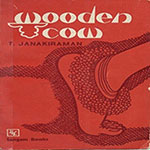T.Janakiraman (1921–82), affectionately known as Thi Jaa, is one of the most influential figures of twentieth-century Tamil literature. He wrote about familial and interpersonal issues, with a focus on the ill-treatment of women, especially widows. His best-known novels, Mohamul, 1964, (The Thorn of Desire), Amma Vantal,1966, (English translation The Sins of Appu’s Mother) and Marappasu,1975, (Wooden Cow) present strong women with a mind of their own. Bilingual novelist, short story writer, poet and translator Lakshmi Kannan had published an English translation of Marappasu in 1979. She felt the need to do a revised version; the birth centenary of the novelist provided the occasion to publish it.
The protagonist of Wooden Cow is Ammani, a spirited woman who flouts societal barriers of caste and class. The first section of the two-part novel has a chronological narrative, as Ammani describes her early life in Annavasal. The poetic descriptions of this village, with its Shankara Jayanti and Arunagirinathar festival, reminds one of Kanthapura in Raja Rao’s eponymous novel. Temple festivals are occasions for Carnatic music performances. Every year Gopali, a gifted vocalist, much in demand in big cities, comes to Annavasal, his birth place, to sing at the Shankara Jayanti. Janakiraman captures the greatness of Gopali’s music, which enthrals everyone, including the child Ammani. Ammani is beautiful, and very good at studies. The village does not have classes above the fifth, so she is taken to her Periappa’s house in Kumbakonam.

